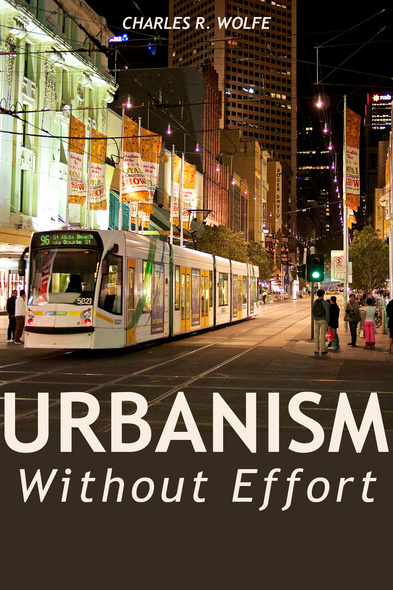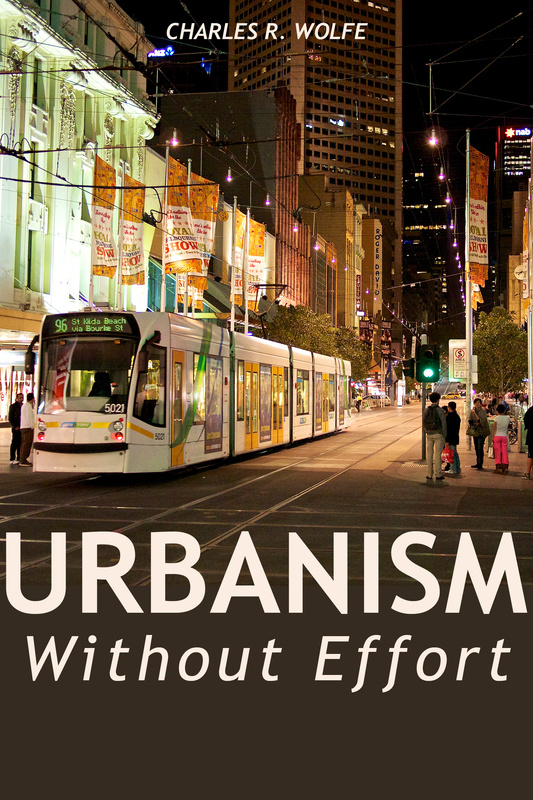Urbanism Without Effort
Reconnecting with First Principles of the City
Island Press
How do you create inviting and authentic urban environments where people feel at home? Countless community engagement workshops, studies by consulting firms, and downtown revitalization campaigns have attempted to answer this age-old question. In Urbanism Without Effort, Chuck Wolfe argues that “unplanned” places can often teach us more about great placemaking than planned ones.
From impromptu movie nights in a Seattle alley to the adapted reuse of Diocletian’s Palace in Split, Croatia, Wolfe searches for the “first principles” of what makes humans feel happy and safe amid the hustle and bustle of urban life. He highlights the common elements of cities around the world that spontaneously bring people together: being inherently walkable, factors that contribute to safety at night, the importance of intersections and corners, and more. In this age of skyrocketing metropolitan growth, he argues, looking to the past might be our best approach to creating the urban future we dream about.
A whirlwind global tour, Urbanism Without Effort offers readers inspiration, historical context, and a better understanding of how an inviting urban environment is created.
From impromptu movie nights in a Seattle alley to the adapted reuse of Diocletian’s Palace in Split, Croatia, Wolfe searches for the “first principles” of what makes humans feel happy and safe amid the hustle and bustle of urban life. He highlights the common elements of cities around the world that spontaneously bring people together: being inherently walkable, factors that contribute to safety at night, the importance of intersections and corners, and more. In this age of skyrocketing metropolitan growth, he argues, looking to the past might be our best approach to creating the urban future we dream about.
A whirlwind global tour, Urbanism Without Effort offers readers inspiration, historical context, and a better understanding of how an inviting urban environment is created.
A plea for a renewed commitment to authentic urbanism and an invitation to learn from history as our cities enter a future of unprecedented change.
One of Chuck Wolfe's great gifts is an extraordinary photographer's eye for capturing visual images of everyday, but evocative, city life. Another is an uncommonly strong intellectual grounding in urban planning theory. In Urbanism Without Effort, he combines the two in unique fashion to show us how unplanned places can often teach us more about great placemaking than planned ones.
Chuck's work is what happens when art meets science in placemaking. His talent for capturing places being themselves is so important in the placemaker's toolkit, yet can be missed if we are not paying attention. Lucky for us, Chuck is always paying attention and this book is the proof.
Wolfe provides something rare in contemporary urbanist writing—rich illustrations and examples from real life—both historical and current. His writing about the past and the future of urban form offers readers inspiration, historical context, and a better understanding of how a sustainable, inviting urban environment is created.
Readers will come away motivated to find, experience and document their own favourite places and find ways to apply effortless urbanism in their own neighbourhood.
...a book of inspiration and aspiration. It makes the reader yearn for places with soul.
...a great ground-level look at how neighborhoods and communities can foster flourishing life in the city.
Wolfe’s excellent book provides a set of startup examples for improving American urban and suburban sustainable reconnections. I recommend this book as a continuation of the positive movement toward sustainable communities.
Charles R. Wolfe provides a unique perspective about cities as a London and Seattle-based urbanist writer, photographer, land use consultant and attorney. He is a Visiting Scholar at KTH University (Royal Institute of Technology) in Stockholm, and a long-time Affiliate Associate Professor in the College of Built Environments at the University of Washington, where he teaches land-use law at the graduate level. Wolfe is author of Urbanism Without Effort and Seeing the Better City, which informed his work as a Fulbright Specialist in Cairns and Townsville, Australia. He has contributed regularly on urban development topics to several publications, including CityLab, The Atlantic, The Huffington Post, CityMetric, Governing, and Planetizen. He blogs at myurbanist.com.
Introduction
Chapter 1. The Dynamic Potential of Urbanism Without Effort
Chapter 2. Observing Urbanism Without Effort at Work, The Human Experience
Chapter 3. Capturing the Best Urban Diary Examples
Chapter 4. Lessons Learned, Collecting the Diaries
Closing
Sources
Acknowledgements
About the Author
Further Reading
Chapter 1. The Dynamic Potential of Urbanism Without Effort
Chapter 2. Observing Urbanism Without Effort at Work, The Human Experience
Chapter 3. Capturing the Best Urban Diary Examples
Chapter 4. Lessons Learned, Collecting the Diaries
Closing
Sources
Acknowledgements
About the Author
Further Reading







